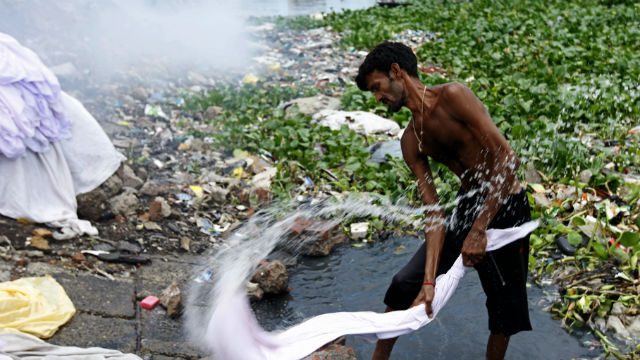SUMMARY
This is AI generated summarization, which may have errors. For context, always refer to the full article.

DHAKA, Bangladesh – Bangladesh imposed a radical new “green tax” on Thursday, June 5, to force polluting factories to pay extra levies as it looks to clean up the country’s increasingly dirty rivers and air.
The environmental tax was announced as part of a $32 billion budget for the 2014-2015 fiscal year, which also focused on giant new infrastructure projects such as a metro in the cramped capital Dhaka and a nuclear power plant to boost growth.
Industrial effluent and waste from urban sewage “is severely contaminating our rivers and taking heavy toll on the aquatic environment and its surroundings,” Finance Minister A.M.A Muhith said as he announced the budget in parliament.
“I propose to impose a one percent Environment Protection Surcharge or Green Tax on an ad-valorem basis on all kinds of products manufactured in Bangladesh by the industries which pollute the environment,” Muhith said.
A revenue official told Agence France-Presse (AFP) the tax would be imposed on a company’s turnover if it is found to have polluted “air, soil and water.”
Muhith also announced tax exemptions for the country’s 6,000 brick factories if they build environmentally friendly kilns.
The budget is the first since Prime Minister Sheikh Hasina’s center-left government was re-elected in January polls marred by widespread fraud and a boycott by opposition parties.
Bangladesh is one of the world’s most polluted nations and Muhith said the green tax would “get rid of this situation” and encourage industries “to set up effluent treatment plants.”
Factories currently face one-off fines if they are found in breach of pollution standards, but bosses often bribe inspectors to turn a blind eye.
Untreated effluent
The new tax would mostly affect the powerful textile and leather processing industries that often pour untreated effluent straight into the country’s rivers.
There are around 200 hide-processing factories based in the Hazaribagh district of Dhaka, listed as the world’s sixth most polluted place by a environment group, but none of them have effluent treatment plants.
Muhith unveiled annual spending plans worth 2,505 billion taka ($32 billion), which would be financed by expanding the tax regime, with the deficit kept within five percent of gross domestic product (GDP).
It included an ambitious $10 billion worth of development spending, including on a string of mega infrastructure projects.
Hasina has already said she wants to cut the number of people living below the poverty line to 10% of the population by 2021, down from the current level of nearly 30%.
“I have said that the target of growth for the next fiscal year would be 7.3%, and in 2021 it would be 10%,” Muhith said, adding that output was likely to have grown by 6.12 percent in the fiscal year ending in June.
Muhith said he would offer tax benefits to job-generating industries such as the key $22 billion garment sector, which has been hit by a series of recent disasters including last year’s collapse of a factory complex that killed 1,138 people.
The finance minister announced full tax exemption for the import of key safety equipment such as fire-resistant doors and sprinkler systems. – Rappler.com
Add a comment
How does this make you feel?
There are no comments yet. Add your comment to start the conversation.